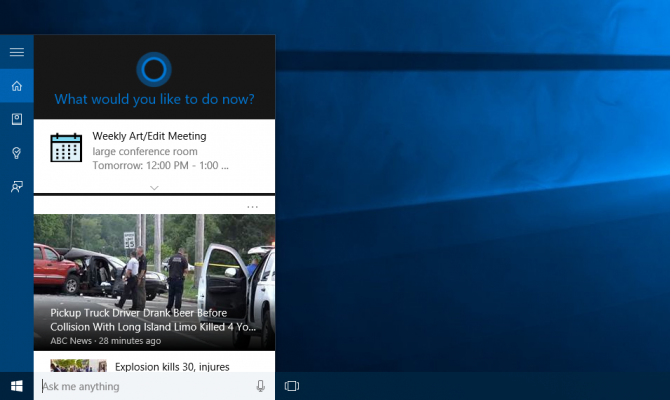Microsoft CEO: Cortana Isn’t Competing With Alexa, Google
Microsoft CEO Satya Nadella doesn’t want to be in the business of also-rans. He’d rather see the company build on top of established platforms, which is why the Cortana voice assistant has made friends with Amazon’s Alexa and Google Assistant.
Nadella expressed this viewpoint during an “invitational media day” at Microsoft’s headquarters, according to Business Insider, earlier this week. Here’s what he reportedly told the journalists who gathered for the event:
"Would it be better off, for example, to make Cortana a valuable skill that someone who is using Alexa can call? Or should we try to compete with Alexa? We, quite frankly, decided that we would do the former. Because Cortana needs to be that skill for anyone who is a Microsoft Office 365 subscriber.”
We already knew Microsoft had decided not to compete with Alexa; the companies integrated each other’s voice assistants into their respective platforms throughout 2018. But the takeaway from Nadella’s presentation is that Microsoft won’t compete in the smart speaker market at all.
Nadella reportedly intimated that Cortana will be similarly integrated with Google Assistant sometime in the future. He said that people should be able to use Cortana on Google Assistant or Alexa, according to Business Insider, just like they can use Microsoft’s iOS and Android apps. It’s not clear if the Google Assistant mention was a sly announcement or a hypothetical.
Either way, Nadella followed with this: “We are very mindful of the categories we enter where we can do something unique. A good one is speakers. To me the challenge is, exactly what would we be able to do in that category that is going to be unique?” Because he didn’t have an answer, Microsoft opted not to bother making an also-ran smart speaker. And honestly? Good on Microsoft.
Too many companies attempt to build platforms months or years after their competitors have established their own. Sometimes this works—Apple is infamous for successfully expanding into existing product categories and pretending they’re brand new. Usually, however, this approach simply leads to needlessly fragmented markets until the also-rans finally call it quits.
Get Tom's Hardware's best news and in-depth reviews, straight to your inbox.
Microsoft’s new approach lets it build its own ecosystems on the platforms its customers already have. That makes it easier to use products from several companies, like pairing a Windows 10 PC with an iPad and Amazon Echo speakers, without having to worry about the availability of certain services for all of those devices. Many consumers prefer this to the siloed approach most companies have taken with their services.
We heard similar promises from Microsoft when it announced the Windows 10 Fall Creators Update in 2017. The company revealed the so-called Microsoft Graph alongside it. Instead of locking down features like clipboard history sharing, document versions, and the like to specific hardware like Apple does with Continuity and Handoff, the Fall Creators Update were the company’s way of making tech better no matter what devices people use.
At least now it’s clear that Microsoft continues to see this approach as viable and that it’s going to apply it to new device categories, like smart speakers, as appropriate. Better to hitch a ride on a competitor’s back than to compete in a race you’re destined to lose, right?

Nathaniel Mott is a freelance news and features writer for Tom's Hardware US, covering breaking news, security, and the silliest aspects of the tech industry.
-
s1mon7 While it's a good approach, I think users would much prefer Cortana to be optional. Just ask during installation, if unticked, don't install it. I can see how all companies would rather have them there for the chance of someone starting to use them just because they're there, but it's a hurdle for the power users if we can't even completely get rid of voice assistants. No OEM gives us choice.Reply -
philipemaciel "Microsoft CEO: Cortana Isn’t Competing With Alexa, Google"Reply
Good. Now let me completely uninstall this useless, privacy-menacing, bloatware. -
ubercake Reply21692338 said:While it's a good approach, I think users would much prefer Cortana to be optional. Just ask during installation, if unticked, don't install it. I can see how all companies would rather have them there for the chance of someone starting to use them just because they're there, but it's a hurdle for the power users if we can't even completely get rid of voice assistants. No OEM gives us choice.
Right on the button. The fact that it's shoved down your throat from the first time you log in to Windows 10 makes it a less than desirable assistant ("a little blah blah here, a little wifi there..." How do I choke this assistant already???). Also, the fact there are "off" switches throughout different menus and not in one place for the various parts of Cortana, make you dislike the assistant and view it with distrust that much more.
They definitely took the wrong approach with Cortana. They should have worked it the other way, made the Cortana functionality more granular and let people turn on useful features by choice. By "learning" the value of Cortana little by little, Windows 10 users would have been more likely to accept the lack of privacy that is bundled with it just like they do with most social media.
